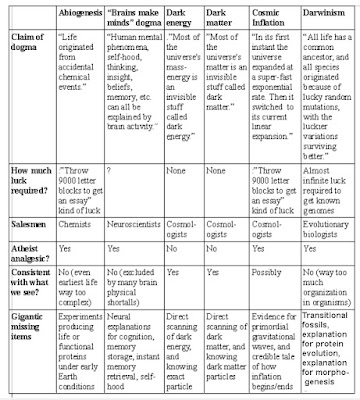Below is an interesting table comparing the dogmas of cosmology (the study of the universe and its origin) and some of the dogmas of biology. The table is too wide for me to display it using this blog's regular font.
First I'll give an image of the table:
Below is a text version that tablet device users will be able to see by finger-swiping to expand.
Abiogenesis | “Brains make minds” dogma | Dark energy | Dark matter | Cosmic Inflation | Darwinism | |
Claim of dogma | “Life originated from accidental chemical events.” | “Human mental phenomena, self-hood, thinking, insight, beliefs memory, etc. can all be explained by brain activity.” | ”Most of the universe's mass-energy is an invisible stuff called dark energy.” | ”Most of the universe's matter is an invisible stuff called dark matter.” | “In its first instant the universe expanded at a super-fast exponential rate. Then it switched to its current linear expansion.” | “All life has a common ancestor, and all species originated because of lucky random mutations, with the luckier variations surviving better.” |
How much luck required? | ”Throw 9000 letter blocks to get an essay” kind of luck | ? | None | None | ”Throw 900 letter blocks to get an essay” kind of luck | Almost infinite luck required to get known genomes |
Salesmen | Chemists | Neuroscientists | Cosmol-ogists | Cosmol-ogists | Cosmologists | Evolutionary biologists |
Atheist analgesic? | Yes | Yes | No | No | Yes | Yes |
Consistent with what we see? | No (even earliest life way too complex) | No (excluded by many brain physical shortfalls) | Yes | Yes | Possibly | No (way too much organization in organisms) |
Gigantic missing items | Experiments producing life or functional proteins under early Earth conditions | Neural explanations for cognition, memory storage, instant memory retrieval, self-hood | Direct scanning of dark energy, and knowing exact particle | Direct scanning of dark matter, and knowing dark matter particles | Evidence for primordial gravitational waves, and credible tale of how inflation begins/ends | Transitional fossils, explanation for protein evolution, explanation for morphogenesis |
The theory of primordial cosmic inflation referred to in the sixth column is not the theory of the Big Bang (the idea that the universe suddenly arose in a super-dense and super-hot state about 13 billion years ago), but a theory about what happened in the first instant of the universe's existence. There are endless versions of this theory of primordial cosmic inflation. This class of theories have been advanced to try to avoid a requirement of very precise fine-tuning in the universe's initial expansion rate. Typically theories of primordial cosmic inflation require very much fine-tuning of their own, meaning that we end up with no net reduction in the amount of fine-tuning required in the early universe.
Claims about the existence of dark matter and dark energy are typically advanced with great confidence, even though there is zero direct empirical support for either dark matter or dark energy, neither of which have been directly observed. Neither dark matter nor dark energy has any place in the Standard Model of Physics. Speculations taught with great certainty are typically dogmas.
An analgesic is a pain reliever. My "atheist analgesic" row refers to whether the dogma is a kind of pain reliever or irritation reliever for atheists. An atheist will tend to be irritated by a variety of things, including (1) any indications that our universe required very precise fine-tuning of a type we would never expect to occur by chance; (2) any indications that living things required design, and could not have arisen by blind unguided processes; (3) any indications that humans have minds or souls that cannot be explained by physical processes such as neural activity. Anything that may tend to lessen such irritation may be described as an atheistic analgesic. It is rather obvious why there is a "pain relief for atheists" effect in the dogmas of abiogenesis, Darwinism and the dogma that the brain makes the mind. The origin of the first theory of primordial cosmic inflation clearly was an "atheist pain reliever" kind of effect. Around 1980 cosmologists were bothered that the early expansion rate of the universe seems to have been fine-tuned to 1 part in 10 to the fiftieth power, such as we could not reasonably explain as being due to chance. So they embraced a theory of primordial cosmic inflation to try to "sweep under the rug" such fine-tuning. The attempt was futile, because theories of primordial cosmic inflation require special conditions so precise and improbable that the total fine-tuning requirement is not reduced. A scientist says this: "It actually requires much more fine-tuning for the Universe to have inflated than for it to have been placed in some low-entropy initial state (Carroll & Chen 2004)." He also refers to "the highly fine-tuned initial conditions required for inflation to work."

No comments:
Post a Comment